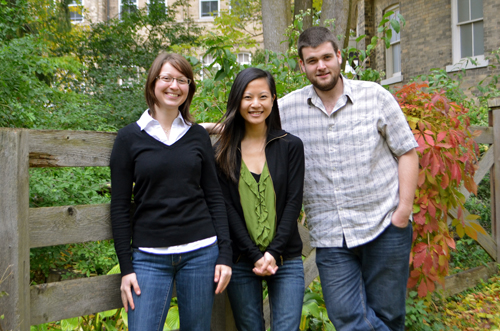
Call Michelle Arseneault a flag-waver for Canada and for global food security. This month, the U of G student will tote the maple leaf at the head of a Canadian delegation of teens and twenty-somethings attending an international gathering on issues from sustainable development to health and education.
Along with students Alice Lin and Dan Kenel, Arseneault earned a spot at the One Young World (OYW) summit this year in Pittsburgh. About 1,500 delegates from practically every country around the world will attend the event, to be held Oct. 18 to 22.
“I think it’s amazing, I’m really excited,” says Arseneault. The third-year agricultural science student was selected in a draw to carry the Canadian flag at the event. “Carrying the flag is being able to unite Canadians with what One Young World is striving to do, which is to lead the world to a better future.”
Organized by One Young World, a London-based charity, the annual event addresses global issues in education, health, business, sustainable development, governance and human rights. Speakers will include Bob Geldof, Jamie Oliver and Muhammad Yunus.
While in Pittsburgh, the Guelph students hope to share and learn more about global food security and sustainability. That was the theme of a separate international contest that brought the trio together earlier this year, ultimately leading them to this fall’s OYW summit.
The students took a course last winter on sustainable communities taught by Prof. Jim Mahone, School of Environmental Design and Rural Development. Near the end of the semester, he pointed the class to the “Thought for Food” challenge. Begun in 2011 by a Columbia University graduate, that annual contest asks student teams to address food issues, including a key problem: how to feed an estimated world population of nine billion people by 2050. This year’s contest attracted more than 50 teams from top universities around the world.
Says Lin, now in her fourth year studying environmental governance: “Food security and food issues have always been my interest. What are we going to do and how to get people to work together?”
Calling themselves Growing for Change, the trio made a short animated video about urban agriculture and permaculture for the first round of this year’s contest.
Along with other finalist teams, they received $500 from the contest organizers toward the next round.
This summer, the Guelph students designed an edible landscape for growing fruits and vegetables in a 150-by-150-foot space. They used social media – Facebook, YouTube and Twitter – to pitch their plan and encourage public votes.
Their entry earned runner-up standing in the contest, behind a team from India that designed a web-based video game and comic series, and a Texas group that developed an eco-park network.
Better yet, the Guelph entry caught the eye of contest partner Syngenta, a global crop protection company. The company has sponsored all three students to attend the Pittsburgh event this month along with the two winning teams.
Back in Guelph, the group is just getting started. They have developed a business plan for a community garden. They hope to work with the City of Guelph to implement their plan next year. “We want to get more involved in the community,” says Kenel.
Arseneault hopes to see community gardeners exploring perennials such as fruit trees, berry bushes and herbs. “There’s a real disconnect with people and how their food is produced. If people knew more about food production, it could really lead us in a better direction.”
She came to Guelph from Dryden, Ont., to learn about sustainable food. A volunteer with the Guelph Centre for Urban Organic Farming, she plans to pursue graduate studies in sustainability and plant production.
Also a third-year agriculture student, Kenel runs a landscaping company in Waterdown, Ont., focused on edible landscaping and permaculture. The latter blends farming with ecological design and engineering principles. He says backyard growers and urban consumers need “green” ideas and tools for growing and obtaining food closer to home.
That’s even more important in a world where more and more people are choosing to live in cities, says Mahone. He adds that his students’ efforts mesh with his goals for the sustainable communities course, including arming undergrads with presentation skills.
“The course is intended to turn students into advocates to change the world. It’s important that these people take their education and do something practical with it. I’m a big believer in their putting their education into action.”